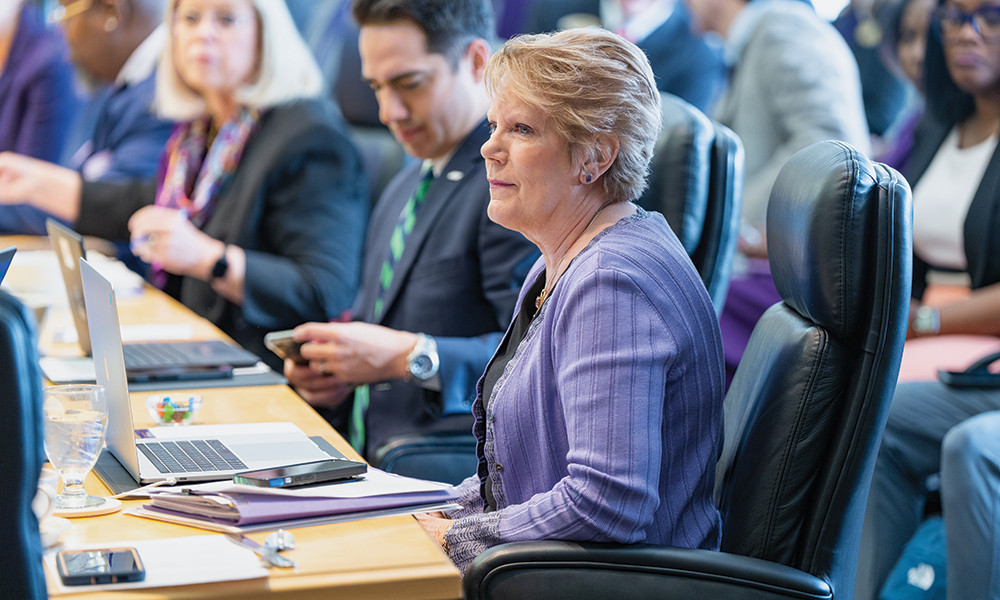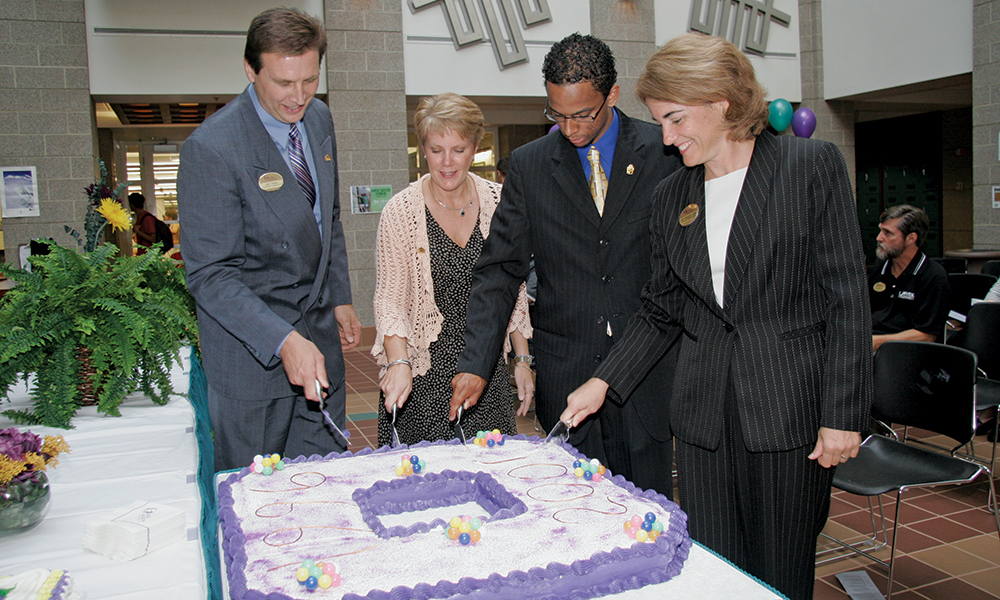‘Challenge and support’
Donna Harper's 47-year run at JMU
Featured Stories
SUMMARY: Donna Harper ('77, '81M, '86Ed.S.) was hired by the university in 1977 to help fraternities and sororities move into their new homes along Newman Lake. Though it was supposed to be only a one-year position, it marked the beginning of a 47-year run at JMU that has included multiple leadership roles. Harper is set to retire in June.
In the spring of 1977, “Hotel California” by the Eagles was No. 1 on the Billboard Hot 100. Construction of Greek Row had just begun. And students graduating that spring could select whether they wanted their diploma to read “James Madison University” or “Madison College,” since the name had just changed in March.
Senior Donna (Warner) Harper (’77, ’81M, ’86Ed.S.) selected Madison College for her diploma and was hired by JMU right after graduation to help fraternities and sororities move into their new homes along Newman Lake. Though it was supposed to be only a one-year position, it marked the beginning of Harper’s 47-year run at JMU. She is set to retire in June.
|
“Donna epitomizes servant leadership. She has never sought leadership positions for the power or prestige, but only to make a difference. And she certainly has made a difference!” — Mark Warner (’79, ’81M, ’85Ed.S.), former vice president of Student Affairs |
“Bill Hall, who was the vice president of Student Affairs, had determined that they wanted to hire two recent graduates to help transition the fraternities and sororities to Greek Row, and help write the policies and procedures,” Harper said of her first gig at JMU. She had been president of her sorority, Alpha Sigma Alpha, and very active in Greek life. So the job came naturally to her.
Soon, an opening in the office of the Dean of Students appeared, and Hall asked if Harper would be interested. Part of her responsibilities was to oversee Greek life, and she jumped at the chance given how much she enjoyed that aspect of her Madison Experience. The position, of course, came with unique challenges — as one would expect overseeing social organizations on a college campus known for its active student life. These conflicts would be most formative in Harper’s career and shaped her approach to the rest of her time at JMU.
“Early on, one fraternity had an unfortunate incident with an animal getting injured in its house,” Harper remembered. “The president called in the middle of the night and told me what had happened.” She met fraternity members the next morning, “And then I got the call from the president to come explain what happened and what we were going to do about it.”
The president at the time was Ronald E. Carrier, a larger-than-life figure who was quite interested in Greek life, having been an enthusiastic member of Sigma Phi Epsilon during his college days. So you can imagine the young Donna Harper in Carrier’s office explaining the fraternity incident with the animal.
“Our philosophy of what we wanted with Greek life was to build trust and respect with the organizations,” Harper said. “It was important to acknowledge what might have gone wrong and help them deal with it and have it be a learning experience.” Dealing with potentially difficult situations in this positive way became a hallmark of Harper’s approach. She went on to work in Judicial Affairs, and in hundreds, if not thousands, of difficult conversations with students, she maintained this orientation. “All along the way, our philosophy was ‘challenge and support, challenge and support.’ Our job is not to give the student the answer. Our job is to help the student find the answer themself. And I think that’s been very consistent.”

PHOTOGRAPH BY DIANE ELLIOTT (’00)
This is an important element of the JMU culture, and Harper’s role in perpetuating it was key. Over her 47 years at the university, Harper held a diverse set of roles: She ran the Health Center and successfully guided the unit to become far more than an infirmary. Harper became an associate vice president in Student Affairs with a broad portfolio of responsibilities. Former President Linwood H. Rose tapped her to be his executive assistant as well as secretary of the Board of Visitors. Eventually, Harper became vice president of Access and Enrollment, overseeing Admissions, Financial Aid, University Events and several other functional units spanning the institution.
Rose said of Harper, “You cannot be a truly student-centered university if you don’t have people leading the institution who are dedicated to student development. Donna Harper was a fixture of my administrative team, because I could always count on her to be the one at the table who would represent the perspective of the student.” Emphasizing her “challenge and support” approach, Rose added, “That is not to suggest that she did not have high expectations of students. She would advocate for students, but she could also be very demanding. I recall when she was advising the Greek organizations that she always held them to the highest standards.”
Interestingly, however, a student could pass through their time at JMU without ever knowing Harper, since she never sought the limelight. Longtime Vice President of Student Affairs Mark Warner (’79, ’81M, ’85Ed.S.) said, “Donna epitomizes servant leadership. She has never sought leadership positions for the power or prestige, but only to make a difference. And she certainly has made a difference! Her humble demeanor and desire to help others succeed are the attributes that have made her such a successful leader.”

